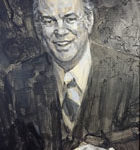
We may miss the meaning of both human and spiritual maturity in our preoccupation with only physical maturity. When we speak of our children reaching their maturity we may strike on the image of a young person beginning their majority on graduation from high school, or reaching his or her twenty-first birthday. It may be a short period that is widely appreciated and sought after in the physical appearance of the individual for decades after firm flesh and inner energy have been diminished, perhaps lost, along with innocence. The period is so attractive to the self of persons that even society tends to forgive early violations of maturity, and permits youth some delay, a factor necessary for the health of… Read more






